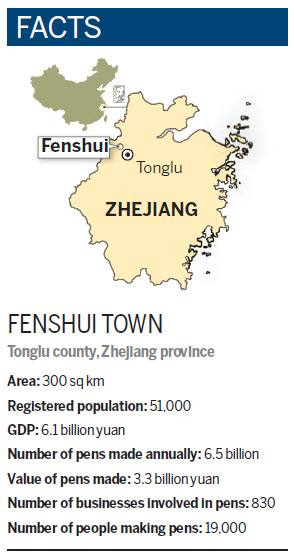The write stuff
Updated: 2011-07-08 11:45
By Alexis Hooi and Hu Haiyan (China Daily European Weekly)
The businesswoman says the high density of people in Fenshui making pens has had cumulative effects on the industry. Buyers from home and abroad naturally find their way to the town as they get wind of the number of options available from the manufacturers.
"There is no need for us to promote our products very much," Zhou says.
The local government has also rolled out favorable policies such as subsidies of up to 25 percent of the cost of machines that Zhou buys to upgrade her facility, she says.
"But the competition here is also very fierce. There are almost 200 companies that are similar to us in scale in this town. Distinguishing our business from others is crucial," Zhou says.
The biggest challenge facing her business is the rising cost of raw materials and wages, she says.
"We cannot raise our prices, since we don't have our own brand. So many competitors surround us and we can only compete with them by coming up with products of better quality and through our relatively lower prices," she says.
"But some small factories that are not
|
|
The pen entrepreneur says she is similarly forced to outsource her assembly operations to villagers in nearby areas because of the labor shortage in the town, adding to costs and complicating the production process.
"If we assemble the pens in our own factory, the cleaner environment can improve quality inspection and efficiency," she says.
Plunging profits are a constant worry for her.
"We now have five workshops. We produce almost 70 million ballpoint pens a year but the returns are small," Zhou says.
"For instance, we make 0.1 yuan at the most from each first-class pen we produce. We make as little as 0.02 yuan from our lower-grade pens.
"Currently, all of our products are sold overseas. For the domestic market, since we don't have our own brand, we have to sell our pens to Yiwu, Zhejiang's major wholesale market for small commodities. But the profits made in this way are even smaller than the export business."
Fenshui Party Secretary Shao Weihua says his town's entrepreneurs prefer to keep their pen businesses small to avoid the risks of expansion, but they still need to "further modernize the industry by moving up the value chain" to fully ride the recovery from the financial crisis.
"Pen production is still labor intensive and limited by technology in many respects," Shao says.
"Retractable ballpoint pens, for example, still need to be assembled by hand. Add to that the shortage of workers and that means we can't fill orders on time," he says.
"We also need to market our pens better and build our own brands."
Zhou Qingyun is already making plans to stand out among so many other similar companies by establishing her own brands.
"We have registered patents for a number of products and we also invest a lot to improve the quality and design of our products, by introducing more modernized technologies and equipment."
Shao says authorities are also boosting research and development to grow the sector. These include pushing programs to tap the creative energies of college students and increasing financial incentives for businesses to become more efficient.
To plug the labor shortage in assembly points and factories, workers are being tapped from up to 300 km away in neighboring Anhui province.
The local government is also helping the town move away from the pen industry by diversifying its economy, such as building on its strengths in the agricultural and textile industries.
For villager Zhou Baiqin, assembling pens is not an option for her 19-year-old son. He is training to be a hairstylist instead.
"It's tough work," she says.
"I'd rather much prefer him to do want he wants."
E-paper

Pearl paradise
Dreams of a 'crazy' man turned out to be a real pearler for city
Literary beacon
Venice of china
Up to the mark
Specials

Power of profit
Western companies can learn from management practices of firms in emerging economies

Foreign-friendly skies
About a year ago, 48-year-old Roy Weinberg gave up his job with US Airways, moved to Shanghai and became a captain for China's Spring Airlines.

Plows, tough guys and real men
在这个时代,怎样才"够男人"? On the character "Man"

